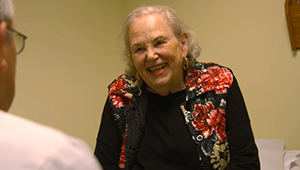Washington state members begin joining the KP research biobank

KPWHRI launches a phone-based recruitment pilot project in May. Outreach to diverse populations is key.
Discovering the best ways to prevent, treat, and cure genetically related illnesses can require massive amounts of health data and DNA from large, diverse populations. More than 340,000 Kaiser Permanente members nationally have volunteered to share their blood samples and health information with the Kaiser Permanente Research Bank, launched in 2016. Doing so, they have become part of a broad-based, communal effort that can drive health improvement among Kaiser Permanente members and the public at-large.
Now, Washington state members are joining that initiative as well. A team from Kaiser Permanente Washington Health Research Institute (KPWHRI) began official recruitment for the Kaiser Permanente Research Bank in January. Over the next two years, the team intends to invite all adult members in the region to join.
Data from the bank will be used by health scientists at Kaiser Permanente and collaborating universities for a broad range of studies in areas such as cancer, heart disease, multiple sclerosis, autism, and more.
“Ours is one of the largest and most diverse biobanks in the world,” says James Ralston, MD, MPH, the KPWHRI senior investigator leading the effort for the Washington region. The Kaiser Permanente Research Bank excels at linking genetic information with comprehensive data collected in electronic medical records over long periods of time.
Members’ privacy protected
In addition to DNA from blood samples and survey data collected when members join the Research Bank, KP’s electronic medical record can provide researchers with longitudinal information from lab tests taken, drug prescribed, illnesses diagnosed, hospitalizations, and more.
“Most of our members get all their care within Kaiser Permanente, so when researchers want to study links between genetic variations and health outcomes, it helps to have such complete data on this large population,” Dr. Ralston adds.
The Research Bank takes steps to ensure that each member’s privacy is always protected, using the highest standards of electronic security. Individuals’ names, birthdays, and other personal details are removed from blood samples and health information given. This information is replaced with a unique study number that is only available to researchers who do approved studies.
“People want to contribute to finding answers,” says Tricia Buscio, RN, MS, KPWHRI’s director of clinical research. “Participating in the KP Research Bank gives everybody a chance to be part of this larger scientific effort.”
Greater diversity is needed
While the KP Research Bank is more diverse than other biobanks around the world, 76 percent of people currently enrolled are non-Hispanic white.
“That doesn’t reflect the diversity of our U.S. population, where non-Hispanic whites are only about 60 percent,” says Dr. Ralston. “Without better representation, our communities of color will not be able to fully reap the benefits of our research. So, we’ll be doing our best to improve our recruitment among more diverse populations.”
Most of KPWHRI’s outreach so far has been by snail mail. But beginning in May, the KPWHRI Survey Research Program will begin a phone-based pilot campaign, calling Kaiser Permanente members throughout Washington state. The Research Bank team will evaluate to see whether this more personalized approach results in higher recruitment among people of color. Pilot projects in other Kaiser Permanente regions that are aimed at increasing diversity include in-person recruitment at clinics, employee orientation, and a community farmer’s market. If such efforts prove successful, the KPWHRI team may follow suit. KPWHRI has also contracted with Kaiser Permanente’s Mid-Atlantic and Georgia regions to conduct phone-based recruitment among members from those areas as well.
All KP members can join today
All KP members are encouraged to join the Research Bank. You don’t need to wait for invitation. You can simply go to the kp.org/researchbank to give your consent and complete a brief health survey. Then you’ll be instructed to go to any Kaiser Permanente lab to give a small blood sample.
The KPWHRI team is also looking for two KP members from the Washington region to join the Research Bank’s Community Advisory Board, which advises the organization on recruitment strategy and resource use, aiming to serve the members’ best interest. Contact KPWHRI Project Manager Aaron Scrol at aaron.scrol@kp.org to learn more about participation on the board.
By Joan DeClaire
Aging & Geriatrics

The science of aging brains: ACT collaborations grow
KPWHRI and UW program continues to be a rich resource for researchers studying resilience and ways to avoid Alzheimer’s disease and other dementias.



